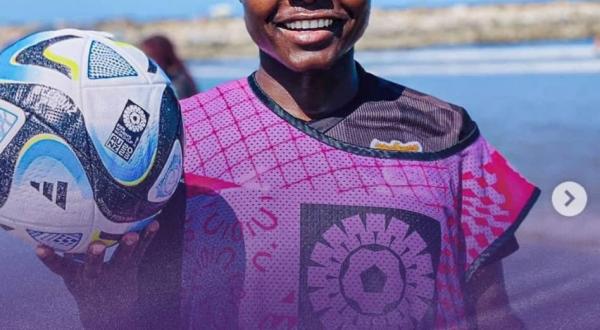Comfort Selemani: “Prize money and conditions should be equal for men and women at World Cups”

Comfort Selemani: “Prize money and conditions should be equal for men and women at World Cups”
- One year on from the Women’s World Cup, Zambian midfielder Comfort Selemani reflects on the improved prize money and conditions for players
- In past editions of the tournament, there was a gap between what participating players experience at the men’s World Cup and Women’s World Cup and the way in which FIFA supported the participating member associations
- While strides have been made, FIFPRO is calling for equal prize money and conditions at the 2027 Women’s World Cup
Having only made her senior international debut just one month before the Women’s World Cup, midfielder Comfort Selemani did not expect to be part of Zambia’s final 23-person squad for Australia & New Zealand 2023.
But when the 19-year-old scored the winning goal in her country’s final send-off game against Tanzania in the Zambian capital of Lusaka, it was clear she was knocking on the door.
When attacking midfielder Grace Chanda was ruled out of the tournament with an illness on the eve of their World Cup opener against Japan, Selemani was drafted in as a late replacement, taking on the No10 jersey.
From Kitwe to Kabwe, Choma to Chipata, there was excitement aplenty across Zambia as the country readied itself for its first senior World Cup.
“It meant a lot to Zambia qualifying for the World Cup for the first time, and it meant it a lot to us as players,” reflects Selemani, speaking to FIFPRO a year on from the tournament.
“As I was on standby, I was not expecting that I'd be called up. But I was training so hard. I was so excited when I finally got the call to be part of the team that went to the World Cup.”
While a debut World Cup was historic for Zambia, Australia & New Zealand 2023 also marked a milestone for all competing players with significant improvements made to prize money and conditions.
In past editions of the tournament, there was a gap between what participating players experienced at the men’s World Cup and Women’s World Cup, and the way in which FIFA supported the participating member associations.
In October 2022, FIFPRO, its member unions and over 150 players from 25 national teams – in what was the largest piece of collective action ever undertaken by women’s football players – sent a letter to FIFA President Gianni Infantino calling for:
- An equal framework of rules and conditions for the Men’s and Women’s FIFA World Cups, including equal prize money for senior World Cups;
- A global guarantee of at least 30 percent of prize money for players who compete in the FIFA Women’s World Cup;
- A binding, global collective agreement between FIFA and the players that enshrines these commitments.
In June 2023, FIFA confirmed guaranteed compensation for all players selected for the competition and identical conditions to those offered to teams at the men’s World Cup in Qatar 2022.
Each individual player at the Women's World Cup was allocated performance-based funding, with every one earning at least USD 30,000, with those from the winning team each receiving USD 270,000.
Selemani describes the prize money as “life changing” for Zambia’s players. “We learned about the prize money increase when we were addressed by management at a camp before the tournament.
“The money was life changing. It enabled me to build a house for my family and renovate another that was incomplete. I also managed to buy a car because, as players in Zambia, we sometimes struggle when it comes to transportation.”
Upgraded player conditions
The conditions and service levels offered to players at Australia & New Zealand were identical to those at the men’s World Cup in Qatar.
This meant identical processes for class of international travel, level of in-competition domestic travel, implementation of team base camp concepts, and standard of accommodation.
“Usually at international competitions the Zambian team has to share rooms, but at the World Cup, we each had our own room,” said Selemani. “We were also able to travel together as a squad; quite often at other competitions we have to travel in different groups.
“The conditions made a huge difference for us, and it was great to experience high-level facilities, especially the medical facilities.”
This commitment from FIFA towards a pathway to equality is something to build on for the 2027 Women’s World Cup in Brazil.
Selemani said: “It is very important in the next World Cup to have equal conditions and prize money.
Women's football never used to be regarded as it is now. What the international men’s players receive from playing at tournaments should now be equal to what women’s players receive because we all have the same responsibilities. It’s important that there is a balance.”
